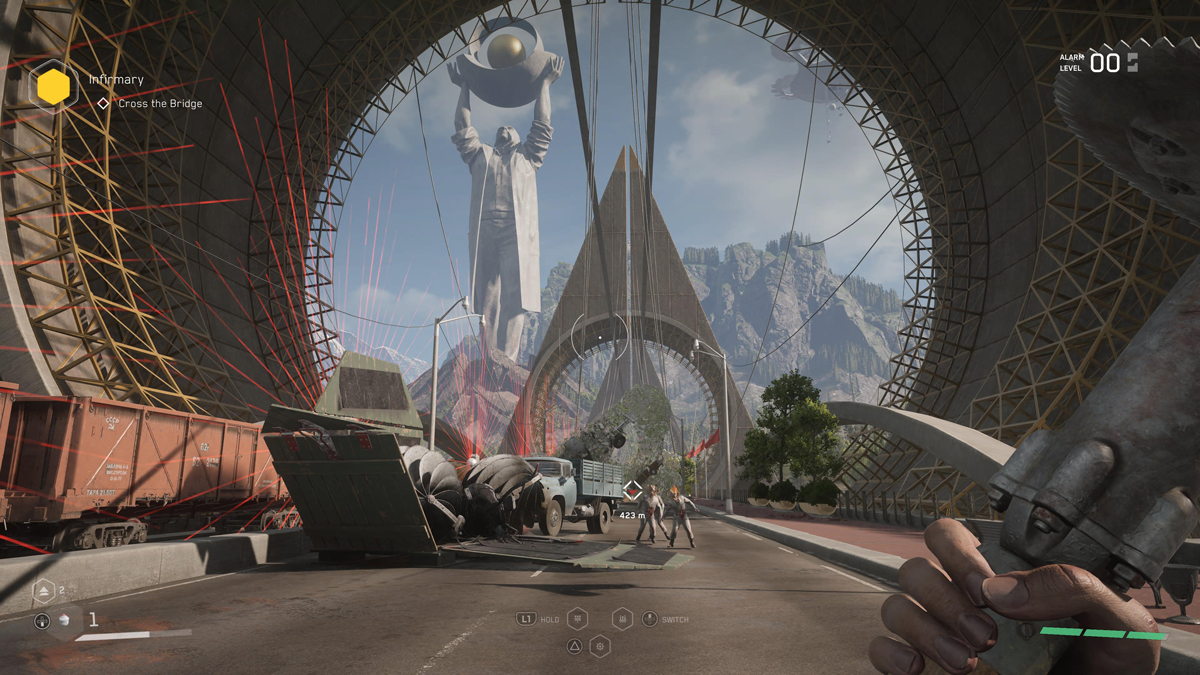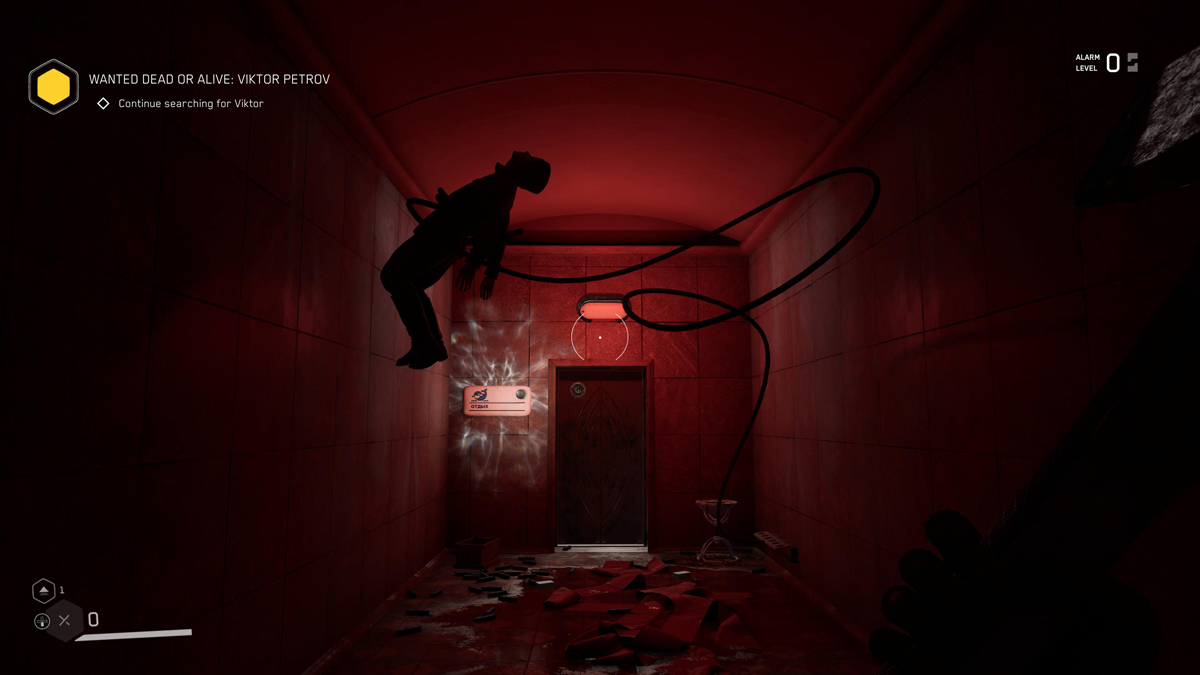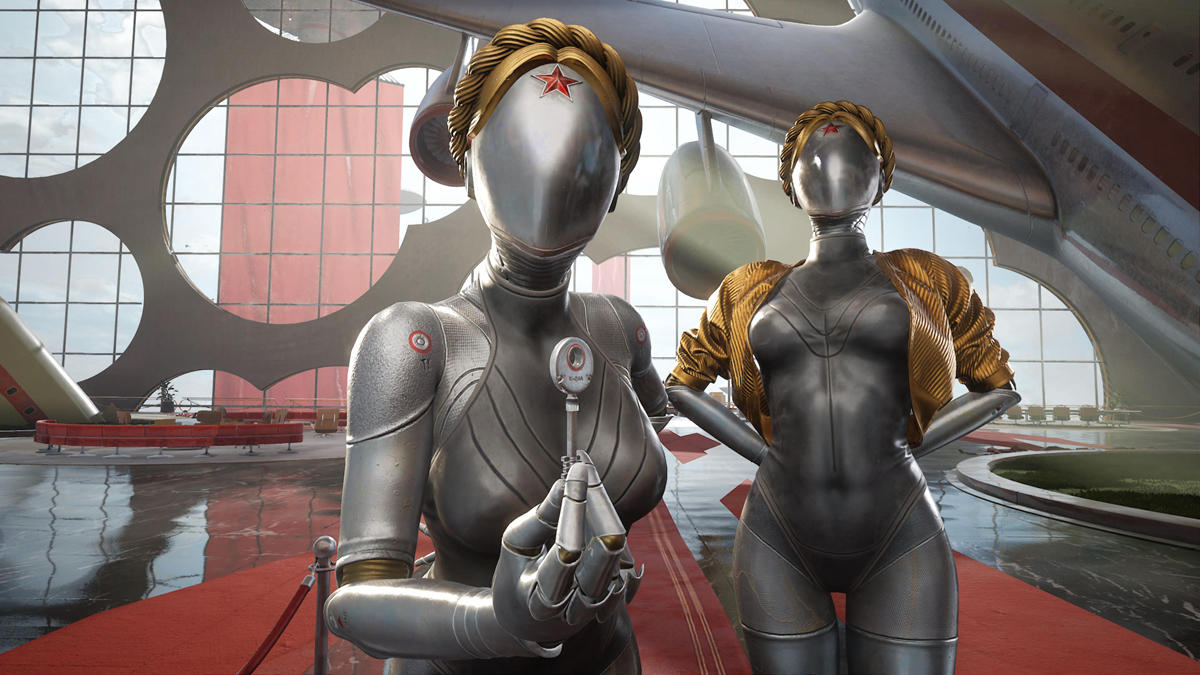For the motherland
Before I get into this Review in Progress, I should probably discuss the elephant in the room. Atomic Heart is the debut title from developer Mundfish, who, in recent weeks, has come under pressure to be more transparent over its ties to Russia. According to a Eurogamer article, which goes into far more detail on the matter than I will here, Mundfish’s investor is the Russian firm GEM Capital, which is run by Anatoliy Paliy, who used to work for the state-owned Gazprom. The developer bills itself as a multinational developer with team members in 10 different countries, including Poland, Ukraine, and the United Arab Emirates. However, the original development team was based in Russia, and Russian-state media has referred to the studio as Russian in reports on the game.
Without more concrete answers from the developer on its ties with Russia, it’s all still kind of up in the air. What we do know for sure is composer Mick Gordon, best known for his work on games like Killer Instinct and Wolfenstein II: The New Colossus, has donated his fee from the game to Red Cross Australia’s Ukraine Crisis Appeal. I’m not going to lecture anyone on whether they should buy this game or not, as there are plenty of people online who are ready to do that. But, I will say, maybe take a peek at that Eurogamer piece before dropping $60 on something that, so far, feels like it’s better suited for a rental than a purchase.

Atomic Heart (PC, PS4, PS5 [reviewed], Xbox One, Xbox Series X|S)
Developer: Mundfish
Publisher: Focus Entertainment
Released: February 21, 2023
MSRP: $69.99 ($59.99 on Steam)
Atomic Heart takes place in an alternate version of the Soviet Union in 1955. The country has experienced a tremendous amount of growth and prosperity thanks to its discovery of Polymer, a substance that paved the way for the advanced robotics that have allowed the nation to flourish. You play as Major P-3, a hardscrabble sort of guy who descends from the city in the clouds to Facility 3826 on a top-secret mission. A terrible atrocity has taken place in this wide-open facility that serves as the birthplace of the Soviet’s robotics empire. Blood stains the streets, and robots that were once considered peaceful are now killing everyone in their path. With the impending launch of the neural network known as the “Kollectiv” that’ll allow people to control robots with their minds, P-3 is dispatched to the facility to find the source of the tragedy before word leaks out.
And these robots are not willing to go down without a fight. As I do with all games I review for Destructoid, I started my time with Atomic Heart on the “normal” difficulty, thinking that it wouldn’t cause me too much trouble. But I quickly realized these robots are built Tonka tough when I emptied a clip into a mustachioed humanoid bot only for it to still come after me like it was the fucking T-1000. It went down with a couple of whacks from my fire axe, and it was then I knew I couldn’t just run and gun my way through place. I would have to be more methodical about it, switching between P-3’s firearms, melee weapons, and assorted glove skills.
Nestled snuggly on his left hand is CHAR-les, a highly adaptive talking glove that can shoot lightning from his hand while dropping some exposition. As you slaughter robots and other creatures at Facility 3826, you’ll collect Polymer and other ingredients you can use to upgrade P-3’s arsenal. With Polymer, you can unlock new skills for CHAR-les, including an electrical shock attack, a freeze attack, and a Polymer shield that protects you from damage. You can also use Polymer to improve P-3’s basic abilities, and I highly suggest you unlock his faster movement speed and double dodge as soon as you can.
You’ll need those skills unlocked because this game ain’t playing around. Even on “normal,” I constantly found myself surrounded and in unwinnable situations. Part of the problem is these robots are awfully light on their feet, and it can be difficult to hear them creeping up behind you. It doesn’t take that many hits from them to completely drain your health bar, and when you get three or four robots all attacking you at once, you can be finished off in seconds. The other problem is, as I said above, these robots often require a lot of damage before they’re put down. On the one hand, that can make for some exhilarating fights for survival. On the other hand, in the early hours at least, you can see these encounters quickly drain you of all your ammunition, leaving you with less-than-ideal first-person melee combat.
Unfortunately, most of the fights I’ve encountered so far — including the several bosses I’ve faced —haven’t really reached a level I’d call “exhilarating.” Most of them have been pretty rote in their execution, and they become more pedestrian as I continue to upgrade my arsenal. So far, the game’s best strategy has been to swarm me with several enemies at once. In the early hours, that was pretty effective as I had several encounters where all I could do is shock, dodge, and swing as I didn’t bring enough ammo to get any use out of my guns. But now that I’ve unlocked so many skills and upgrades, the game is going to need to think of a new trick if it wants to keep me feeling challenged.
It also needs to start doing a bit more with its story. Right now, it’s all pretty elementary, with P-3 caught in the middle of a mystery where he doesn’t completely know who he can trust. Nothing too unpredictable has happened yet, and the game is starting to foreshadow some pretty obvious twists. For anyone who watched a trailer for this game and thought it was nothing more than “Soviet Bioshock,” that’s pretty much all it’s been so far, right down to the audio logs and some of the game’s chosen settings. There is still plenty of time for Atomic Heart to forge its own path, one that doesn’t immediately draw comparisons to Ken Levine’s creations, and I’ll let you know if it does in the full review.

Before I wrap up, I want to touch on the dialog and voice acting. I’ve been playing in English for most of the game, and it’s been less than stellar. Nobody seems to have a Russian accent, P-3 talks like he’s living in our modern era and not in 1955, when the game takes place, and it’s clear the developers are trying to make his catchphrase — “Crispy Critters” — a “thing.” There is a Russian voice-over option, which is how I think this game should be played.
However, Atomic Heart’s dialog is conversation and banter heavy, with P-3 and CHAR-les pretty much talking throughout the adventure. In English, it’s easy to follow along. When I switch to Russian, I have to rely on the way-too-small subtitles that will be ignored if they’re chatting it up while I’m in the heat of battle. That’s not to say that every word they say is gold, but a lot of important exposition has reared its head while I was busy dodging robot lasers.
I’m going to try not to miss any more conversations as I continue to work my way toward the heart of Atomic Heart. Ten hours in, I still don’t know where I stand with it. It’s big and beautiful with plenty of potential. And there is something quite captivating about this version of the Soviet Union that Mundfish has created. All that said, the gameplay hasn’t yet shown itself to be anything more than a standard shooter, and the story has a long way to go to get out from under the shadow of the franchise it so clearly wants to replicate.
[This review in progress is based on a retail build of the game provided by the publisher.]








